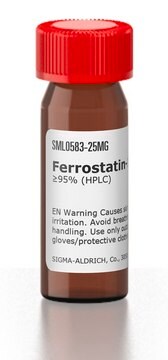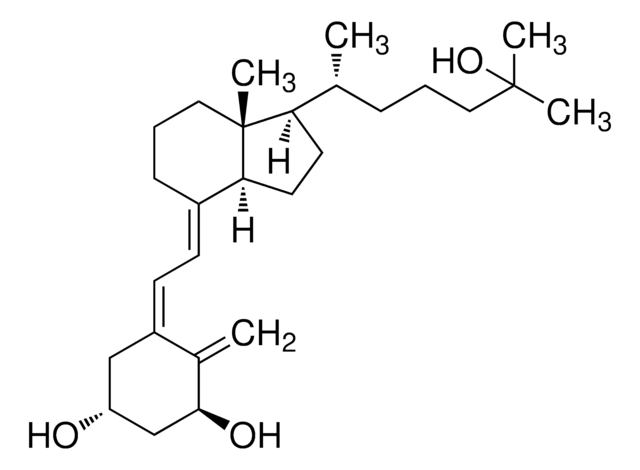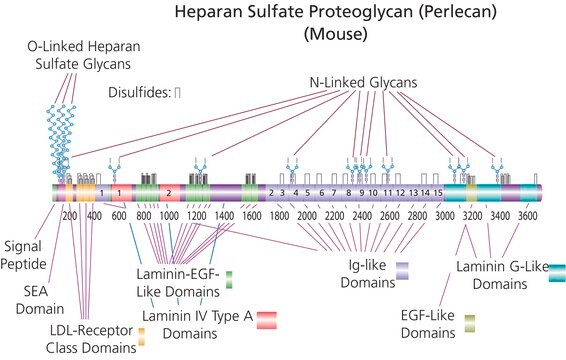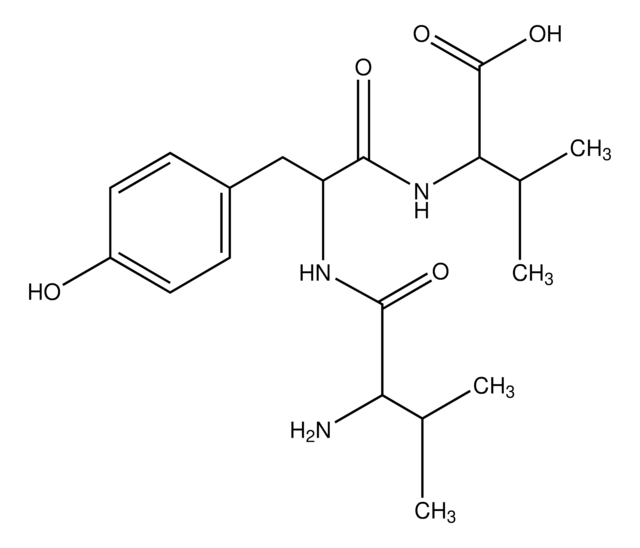CC101
Human Integrin αVβ3 Protein, Triton X-100 Formulation
Sign Into View Organizational & Contract Pricing
All Photos(1)
About This Item
UNSPSC Code:
12352202
eCl@ss:
32160405
NACRES:
NA.41
Recommended Products
biological source
human
Quality Level
Assay
>95% (electrophoresis)
form
liquid
manufacturer/tradename
Chemicon®
concentration
200 μg/mL
NCBI accession no.
UniProt accession no.
Gene Information
human ... ITGAV(3685)
General description
Integrin alphaVbeta3 was purified from human placenta by affinity chromatography using immobilized monoclonal antibodies to alphaVbeta3 integrin. A tissue detergent extract, which was applied to the column was prepared as previously described [Belkin, 1990].
Two main protein bands corresponding to alphaV (145 kDa) and beta3 (92 kDa) subunits are seen in silver stained polyacrylamide gels under non-reducing conditions. Minor protein band (170 kDa) corresponds to beta3 subunit disulfide dimer.
Two main protein bands corresponding to alphaV (145 kDa) and beta3 (92 kDa) subunits are seen in silver stained polyacrylamide gels under non-reducing conditions. Minor protein band (170 kDa) corresponds to beta3 subunit disulfide dimer.
Application
Electrophoresis and Immunoblotting control. Also useful for in vitro binding
experiments with metalloproteinase MMP-2 .
experiments with metalloproteinase MMP-2 .
Physical form
Purified protein in 20 mM Tris-HCI, pH 7.5, 150 mM NaCI, 2 mM MgCI2, 0.2% Triton X-100. No preservatives.
Storage and Stability
Maintain at -70°C in undiluted aliquots. Avoid repeated freeze/ thaw cycles.
Analysis Note
7.5% SDS-PAGE by the method of Laemmli gives two major protein bands, corresponding to alpha V subunit (145 kDa) and beta 3 subunit (92 kDa) when visualized by silver stain (2-2.5 mg protein / lane nonreduced).A minor protein band (170 kDa) corresponds to the beta 3 dimer, similar to an occurrence of the beta 1 dimer upon purification of beta 1 integrins [Belkin et al., 1996].In some cases a beta 3 trimer is visible at 260 kDa.After reduction, with protein quantities of 1.5 - 4μg protein / lane, three major protein bands are apparent, corresponding to beta 3 integrin subunit (110 kDa), heavy alpha V chain (125 kDa) and light alpha V chain (25 kDa).A minor band at 200 kDa region is presumed to be the reduced beta 3 dimer, consistent with previous publications describing a 230 kDa beta 1 reduced dimer for beta 1 integrin purifications described previously.[Belkin et al.,1996].Faint bands at 80 kDa and 55 kDa correspond to minor degradation products of beta 3.CONTAMINANTS: Two faint bands identified at 210 and 220 kDa, which may correspond to the alpha V dimer.
Specific Activity: Functional activity confirmed by interaction of integrin alphaV/beta3 with vitronectin, von Willebrand Factor, fibrinogen, and fibronectin in RGD-dependent ELISA testing.
Legal Information
CHEMICON is a registered trademark of Merck KGaA, Darmstadt, Germany
Disclaimer
Unless otherwise stated in our catalog or other company documentation accompanying the product(s), our products are intended for research use only and are not to be used for any other purpose, which includes but is not limited to, unauthorized commercial uses, in vitro diagnostic uses, ex vivo or in vivo therapeutic uses or any type of consumption or application to humans or animals.
Storage Class Code
12 - Non Combustible Liquids
WGK
WGK 2
Flash Point(F)
Not applicable
Flash Point(C)
Not applicable
Certificates of Analysis (COA)
Search for Certificates of Analysis (COA) by entering the products Lot/Batch Number. Lot and Batch Numbers can be found on a product’s label following the words ‘Lot’ or ‘Batch’.
Already Own This Product?
Find documentation for the products that you have recently purchased in the Document Library.
V M Belkin et al.
Biochemistry and molecular biology international, 40(1), 53-60 (1996-09-01)
Integrins of the beta 1 family were isolated from human smooth muscle. SDS-PAGE analysis and subsequent immunoblotting demonstrated that integrin samples contain a protein immunologically related to beta 1 integrin subunit with the previously undescribed apparent molecular mass 205 kD.
Abdullah Karadag et al.
Cancer research, 65(24), 11545-11552 (2005-12-17)
The up-regulation of various matrix metalloproteinases (MMP), certain cell receptors such as integrins and CD44, and the SIBLING family of integrin-binding glycophosphoproteins have been reported separately and in various combinations for many types of tumors. The mechanisms by which these
Nikos E Tsopanoglou et al.
American journal of physiology. Cell physiology, 283(5), C1501-C1510 (2002-10-10)
Thrombin has been reported to be a potent angiogenic factor both in vitro and in vivo, and many of the cellular effects of thrombin may contribute to activation of angiogenesis. In this report we show that thrombin-treatment of human endothelial
Our team of scientists has experience in all areas of research including Life Science, Material Science, Chemical Synthesis, Chromatography, Analytical and many others.
Contact Technical Service





